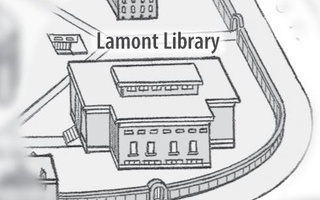UPDATED: August 31, 2012, at 1:13 a.m.
Harvard College’s disciplinary board is investigating nearly half of the 279 students who enrolled in Government 1310: “Introduction to Congress” last spring for allegedly plagiarizing answers or inappropriately collaborating on the class’ final take-home exam.
Dean of Undergraduate Education Jay M. Harris said the magnitude of the case was “unprecedented in anyone’s living memory.”
Harris declined to name the course, but several students familiar with the investigation confirmed that Professor Matthew B. Platt's spring government lecture course was the class in question.
The professor of the course brought the case to the Administrative Board in May after noticing similarities in 10 to 20 exams, Harris said. During the summer, the Ad Board conducted a review of all final exams submitted for the course and found about 125 of them to be suspicious.
Platt declined The Crimson’s request for comment.
If found guilty of academic dishonesty, students could be required to withdraw from the College for a year, among other possible sanctions.
The final examination in “Introduction to Congress,” which included three multi-part short answer questions, a bonus short answer question, and an essay question, came with the instruction: “The exam is completely open book, open note, open internet, etc. However, in all other regards, this should fall under similar guidelines that apply to in-class exams. More specifically, students may not discuss the exam with others—this includes resident tutors, writing centers, etc.”
Dean of the Faculty of Arts and Sciences Michael D. Smith sent an email to all faculty members about the case, and Harris also sent a message to the student body and their parents on Thursday. That letter said that all students who are under investigation have been contacted.
Harris said the College’s unusual step of announcing the investigation was intended in part to launch a broader conversation about academic integrity.
“It’s something that I think was obviously not going to stay secret, clearly, and nor do we want it to,” Harris said. “I think it’s important for us to be able to take an event like this and teach it, treat it as a teaching opportunity.”
A junior government concentrator who took the class last spring said she suspected that Government 1310 was the course in question when she received Harris’ email Thursday. Though she said she followed the exam instructions and is not being investigated by the Ad Board, she said she thought the exam format lent itself to improper academic conduct.
“I can understand why it would be very easy to collaborate,” said the student, who was granted anonymity by The Crimson because she said she did not want her name associated with plagiarism allegations. “It was almost like a science exam that you take in person, but at home.... Many of the questions were, ‘Find the answer and basically say why this is the way it is.’”
Grades for Government 1310 were calculated solely based on four equally weighted take-home exams, each worth 25 percent of the final grade, according to the course syllabus.
Read more in News
Excited and Nervous, Class of 2016 Arrives on CampusRecommended Articles
-
Exams, Housing Day ConflictWith midterm season in full force, Lamont Library Café worker Sharon S. Song ’12 says business is booming.
-
Exams Interrupt Jewish High HolidaysThis year, Rosh Hashana—the date of which is determined by the Gregorian calendar—occurred later than usual and coincided with a spate of exams and paper due dates.
-
Administration Debates Evening ExamsStudents could see evening final exams and a shortened exam period if a proposal discussed at Wednesday’s Committee on Undergraduate Education meeting comes to fruition.
-
No Evening ExamsWe are very concerned about the effect this exam schedule would have on students who already become considerably stressed during the current exam schedule.
-
 The Lamont Garden
The Lamont Garden -
Typo at Root of Cheating Scandal, Letter RevealsProfessor of Government 1310 noted suspicious similarities between exams in his original letter to the Ad Board.














